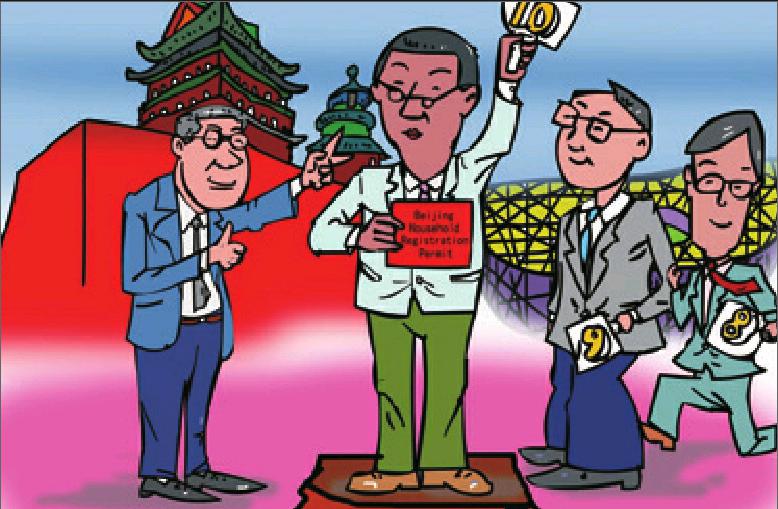Is Beijing’s Points System for Household Registration Fair Enough?
2016-01-15

The Beijing Municipal Government published the regulation on the points system for household registration on December 10 to solicit opinion online.
Under the points system, employment, accommodation, educational background, skill level, tax payments, and credit records, among other things, are converted into points. Migrants can obtain a Beijing household registration permit or hukou on reaching a specified number of points. The total required will be published each year and will be based on population changes in the city.
Applicants should be under 45 years old, have a Beijing residence permit and have paid social security premiums in Beijing for at least seven consecutive years. They also need to comply with family planning policy and have no criminal record.
In China, hukou allows access to education, healthcare and other social services. The system was introduced in 1950 and has long been controversial because it separates citizens into urban and rural residents and makes relocation between rural and urban areas difficult. Reforms on the hukou system have been enacted since the 1980s. It has become easier for rural residents to gain a hukou for smaller cities. However, a hukou for first-tier cities such as Beijing remains difficult to obtain.
The points system has been met with a mixed reaction. Some hail the move as social progress, but others say its still pretty hard to gain a Beijing hukou under the new system.
A progress
Shu Xinping (Legal Daily): Beijings status as the capital of China and the resources it possesses have always made a Beijing hukou attractive, especially to migrants who have settled in the city. Without a local hukou, migrants cannot access the same level of social benefits and educational opportunities for their children.
However, Beijing is curbing its population growth. It has pledged to relocate those functions not essential to its role as the nations capital to neighboring Hebei Province. The city plans to keep its population below 23 million by 2020 in an attempt to ease the pressure on transportation and water resources caused by the steep population growth during recent decades. Such moves mean the city will be more selective on granting hukou to migrants.
Nevertheless, the points system shows Beijings openness and inclusiveness by offering migrants a chance. From this perspective, the regulation should be applauded.
Equal access needed
Su Xiaoxiao (CRI Online): The points system suggests Beijing only wants to absorb the high-caliber talents because only those with higher degrees and income levels seem likely to have a chance of being granted a hukou. This attitude fits in with the purpose of many first-tier cities. They want talented people to settle where they work.
However, the fairness and efficiency of the system seem questionable. The regulation doesnt specify the minimum score required to obtain a hukou but says the score will be set every year by the local government. It will be difficult for people to know whether they qualify in advance.
Furthermore, the system doesnt show special preference for technical talents. Too much consideration is placed on the higher degrees of applicants, the stability of their jobs, ownership of housing and the amount of tax they pay. Topnotch technical talents are scarce. They play an important role in their work places in Beijing, and their skills should be given more points in order to keep them.
The regulation does award points to those who relocate from the six central districts of Beijing, such as Dongcheng and Xicheng, to other districts of the city. This approach will serve as an effective way to encourage population flow from downtown areas to the suburbs and cure urban diseases such as congestion and air pollution.
Jiang Wen (www.cnhubei.com): The points system gives preference to degree holders and investors. For instance, those who have a degree will be credited with points. The higher their degree, the more points they get. Investors are also favored. Those who pay more than 100,000 yuan ($15,470) a year in taxes will get six points. Ordinary workers can hardly get any points and are at a disadvantage under the new system.
Obviously, a city needs highly educated and competent talents in order to develop. However, it also needs ordinary laborers. The contribution of a university graduate may not necessarily be greater than that of a vocational school graduate. Therefore, a person who has paid the required amount of social security premiums and plans to live long term in the city should have an equal chance to gain a hukou.
If manual workers or those working for the service sector are discriminated against in the points system, it will hamper the development of the industries where they are employed.
As Lu Jiehua, professor of sociology at Peking University, said, if the points system only targets high-end talents, it will only grant a hukou to several thousand people every year and fall short of peoples expectations for household registration reform.
Alternative measures
Li Yujia (National Business Daily): Many are disappointed by the points system being too strict. However, no other city in China shoulders as many functions as Beijing, which acts as the countrys political, financial, cultural, education, sports and healthcare center. Therefore, the city has a strong allure for people from not only neighboring provinces but also the whole country.
From 2000 to 2013, the citys population increased by 7.52 million. The present rate of growth is even faster. A lax hukou system may encourage a greater population influx and run counter to the citys policy of capping its population at 23 million by 2020.
However, a strict hukou system by itself will not alleviate the problems caused by people swarming into Beijing. More needs to be done to tackle traffic congestion and air pollution.
For instance, the development of small and medium cities surrounding Beijing should be boosted by building railways and industrial parks. In this way, people in Beijing will be drawn to these areas and so ease pressure on the capital.
Zhang Zheng (www.cyol.com): The function of the residence permit should not be ignored in the implementation of the points system for household registration because the system can only grant a hukou to a select few. The residence permit system should allow those unable to acquire a hukou at the moment to obtain basic public services. When a residence permit entitles residents to the same level of services as a hukou, the clamor for a hukou will subside.
A hukou in a big city will continue to be hard to come by for a long time. The implementation of the system will therefore be complicated and a sensitive issue. It will be a test for the governance of the municipal government. The policy should be open, fair and take public opinion into consideration.
